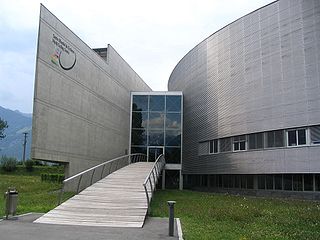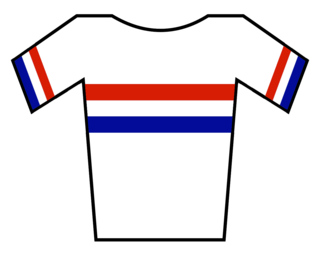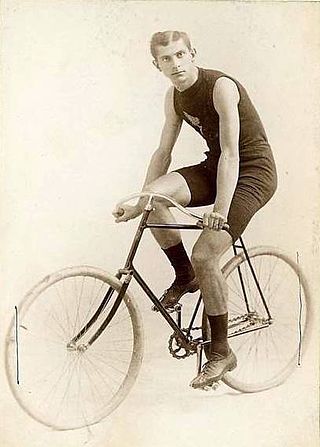
The Union Cycliste Internationale is the world governing body for sports cycling and oversees international competitive cycling events. The UCI is based in Aigle, Switzerland.

British Cycling is the main national governing body for cycle sport in Great Britain. It administers most competitive cycling in Great Britain, the Channel Islands and the Isle of Man. It represents Britain at the world body, the Union Cycliste Internationale (UCI) and selects national teams, including the Great Britain (GB) Cycling Team for races in Britain and abroad. As of 2020, it has a total membership of 165,000.

Henri Desgrange was a French bicycle racer and sports journalist. He set twelve world track cycling records, including the hour record of 35.325 kilometres (21.950 mi) on 11 May 1893. He was the first organiser of the Tour de France.

Road bicycle racing is the cycle sport discipline of road cycling, held primarily on paved roads. Road racing is the most popular professional form of bicycle racing, in terms of numbers of competitors, events and spectators. The two most common competition formats are mass start events, where riders start simultaneously and race to a set finish point; and time trials, where individual riders or teams race a course alone against the clock. Stage races or "tours" take multiple days, and consist of several mass-start or time-trial stages ridden consecutively.
The Bordeaux–Paris professional cycle race was one of Europe's classic cycle races, and one of the longest in the professional calendar, covering approximately 560 km (350 mi) – more than twice most single-day races. It started in northern Bordeaux in southwest France at 2am and finished in the capital Paris 14 hours later. The professional event was held from 1891 until 1988. It was held as an amateur event in 2014.
The British League of Racing Cyclists (BLRC) was an association formed in 1942 to promote road bicycle racing in Great Britain. It operated in competition with the National Cyclists' Union, a rivalry which lasted until the two merged in 1959 to form the British Cycling Federation.
The National Cyclists' Union (NCU) was an association established in the Guildhall Tavern, London, on 16 February 1878 as the Bicycle Union. Its purpose was to defend cyclists and to organise and regulate bicycle racing in Great Britain. It merged with the Tricycle Association in 1882 and was renamed the National Cyclists' Union in 1883.
Cycling Time Trials is the bicycle racing organisation which supervises individual and team time trials in England and Wales. It was formed out of predecessor body the Road Time Trials Council (RTTC) in 2002.

Frederick Thomas Bidlake was an English racing cyclist of the late 19th century, who became one of the most notable administrators of British road bicycle racing during the early 20th century. The annual Bidlake Memorial Prize, was instituted in his memory. He was a timekeeper in cycling, motorcycling and for seaplane races in the 1930s.

Scottish Cycling, legally the Scottish Cyclists' Union (SCU), is the governing body for cycle sport in Scotland and is part of British Cycling, the national governing body in Britain.

George Pilkington Mills was the dominant English racing cyclist of his generation, and winner of the inaugural Bordeaux–Paris cycle race. He frequently rode from Land's End to John o' Groats, holding the world record time on six occasions between 1886 and 1895. He was a member of the Anfield and North Road cycling clubs. He later won races and broke records as a car racer and motorcycle rider.

The Fédération Française de Cyclisme (FFC) or French Cycling Federation is the national governing body of cycle racing in France.
Percy Thornley Stallard was an English racing cyclist who reintroduced massed-start road racing on British roads in the 1940s.

The UCI world championships are annual competitions promoted by the Union Cycliste Internationale (UCI) to determine world champion cyclists. They are held in several different styles of racing, in a different country each year. Championship winners wear a white jersey with coloured bands around the chest for the following year. The similarity to the colours of a rainbow gives them the colloquial name of "the rainbow jersey." The first three individuals or teams in each championship win gold, silver and bronze medals. Former world champions are allowed to wear a trim to their collar and sleeves in the same pattern as the rainbow jersey.

The British National Road Race Championships cover different categories of British road bicycle racing events, normally held annually.
Dave Bedwell was one of Great Britain's most accomplished racing cyclists in the 1950s, known as the "Iron Man" of cycling. He won four stages in the first Tour of Britain, rode for Britain in the world professional road championship in 1953 and 1956 and rode for Britain in the Tour de France.

Arthur Augustus Zimmerman was one of the world's greatest cycling sprint riders and winner of the first world championship in 1893. His prizes as an amateur were a consideration in the establishment of the International Cycling Association (ICA).
Robert John Maitland was a British racing cyclist. He won national championships in Britain, tackled long-distance records, was the best-placed British rider in the 1948 Olympic road race, and rode for Britain in the Tour de France. His career coincided with a civil war within British cycling as two organisations, the National Cyclists Union and the British League of Racing Cyclists, fought for the future of road racing.

John "Ian" Steel was a Scottish racing cyclist who in 1952 won the Peace Race, a central European race between Warsaw, Berlin and Prague. He was the only Briton, and the only rider from the English-speaking world to win it, as well as the first Briton to win any major race. He also won the Tour of Britain as a semi-professional and was at one stage second in the 1952 Tour of Mexico before crashing.
The Roads Improvement Association, established in 1882, was a British organisation which campaigned for better roads in the late 19th century and first half of the 20th century. Founded by cycling organisations ten years before the first motor cars arrived on the roads, it became predominantly a motoring body before World War I.











